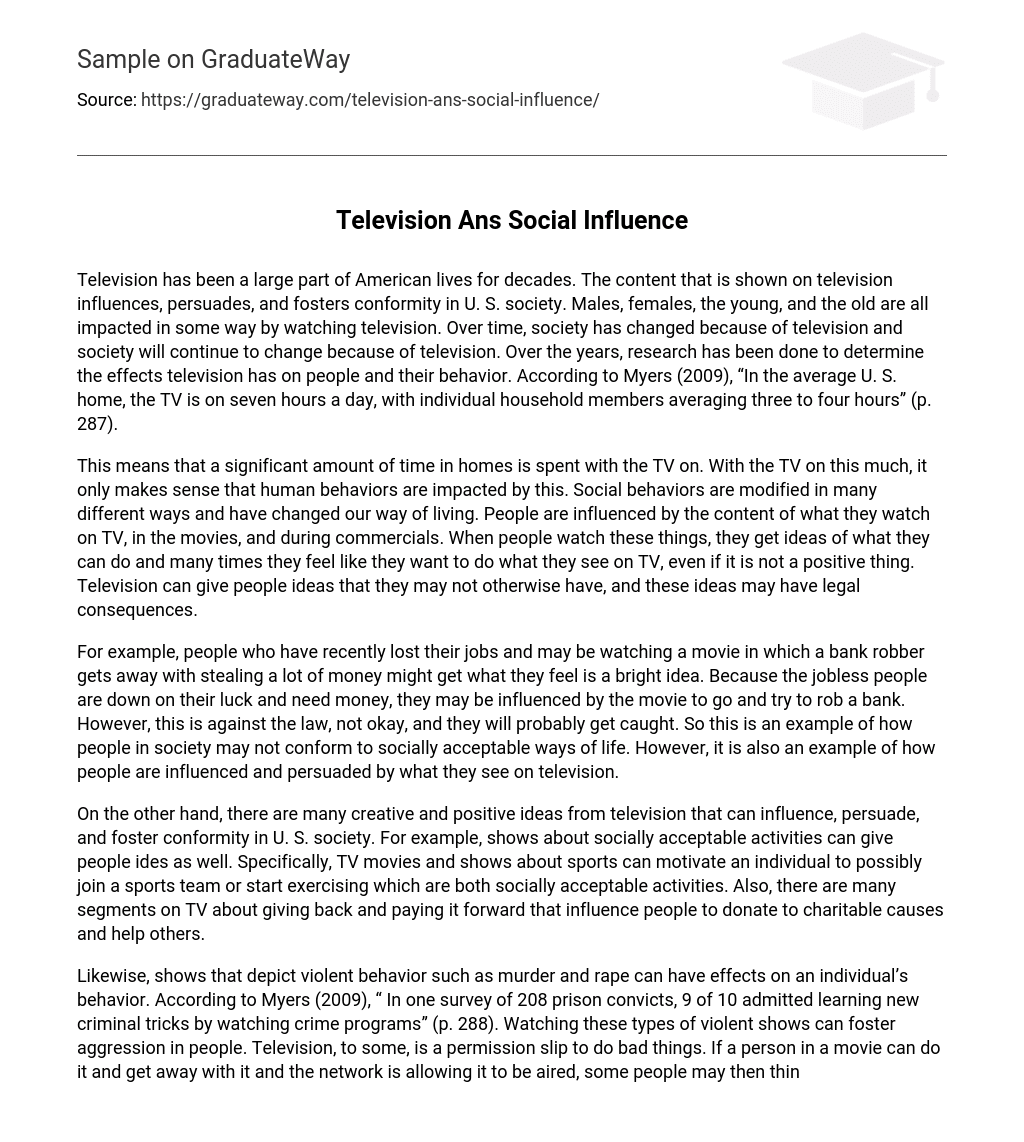Television has long been a powerful force in American society, molding viewpoints and promoting uniformity. Its impact spans across all demographics, ensuring lasting societal transformations. Extensive studies have sought to understand the influence of television on individuals and their behaviors. Myers (2009) reveals that on average, American households keep their televisions on for seven hours daily, while individuals spend about three to four hours actively watching it.
Television’s prevalence in households has significantly influenced human behavior, leading to changes in social interactions and lifestyles. The content viewed on TV, including programs, films, and advertisements, holds substantial influence over individuals. Consequently, people tend to replicate what they see on television without regard for its positive or negative effects. Furthermore, television introduces viewers to novel ideas that they might not have otherwise encountered, potentially resulting in legal consequences.
Television has a significant impact on individuals, potentially leading them to deviate from socially acceptable behavior. For example, someone who is unemployed and watches a movie showing a successful bank robbery may be tempted to imitate the crime. This temptation arises from their unfortunate situation and financial desperation, making them vulnerable to the film’s portrayal. However, it is important to recognize that engaging in a bank robbery is illegal and unethical, ultimately resulting in apprehension. Therefore, this situation highlights television’s ability to influence particular segments of society and emphasizes the need to resist negative influences.
However, television also has the power to positively impact society by shaping people’s thoughts and behaviors. It can inspire individuals with ideas through TV programs that showcase socially acceptable activities. This is evident in sports-focused shows and movies, which can motivate viewers to participate in physical activities like joining a sports team or exercising – both of which are considered socially acceptable. Additionally, television features segments that highlight the importance of giving back and paying it forward. These segments serve as influential factors in encouraging people to support charitable causes and help others.
Myers (2009) states that exposure to violent acts on television can impact behavior. In a study with 208 prison convicts, it was found that 90% of them learned new criminal skills from watching crime programs (p. 288). Thus, viewing violent content on TV can lead to heightened aggression in individuals. Some people see television as justification for engaging in illegal activities, as they observe characters getting away with unlawful acts without consequences and the network allowing such shows to be aired.
Television has a broad influence on people, regardless of their personal involvement. It directly impacts viewers by influencing their behavior, while even non-viewers are indirectly affected by the actions of those who do watch. The societal impact of television is substantial, especially among younger generations. Chevallier and Mansour (1993) state that children in the USA and other developed and developing countries now spend more time watching TV than attending school. This indicates that young individuals are particularly vulnerable to its effects compared to older ones.
According to research, television violence can have harmful consequences on children and society as a whole. This is especially worrying because children are still developing their social skills and coping mechanisms. Watching violence on TV can teach them unhealthy ways of dealing with difficulties. Eastman (2001) argues that when children repeatedly see violence being portrayed as an acceptable solution to problems on TV, they are likely to adopt the same approach when faced with their own challenges (p. 8).
Despite the continuous growth and increasing reliance on the World Wide Web for information and entertainment, television’s importance may diminish in the future. Nonetheless, it still plays a crucial role in people’s lives and is expected to remain significant for at least the next decade. This is particularly important as young individuals are currently forming their sexual identities, and given that television features extensive sexual content, it could potentially have negative effects on their natural instincts. Therefore, it is essential to acknowledge the impact of television on individuals as they continue to be influenced by what they see and hear.
Although television may decline in the future as technology advances, producers will still create new and exciting content because the entertainment industry is massive. People will continue to be captivated by television’s imaginative narratives and surprising twists. Even if television becomes less popular in 20 or 50 years, some form of entertainment will always shape and influence conformity in U.S. society.





